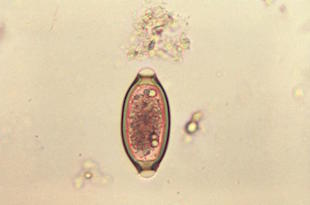 Egg from a human whipworm (Trichuris trichiura)CDC, B.G. PARTINNot all parasitic worm infections are detrimental. Researchers at the New York University (NYU) Langone School of Medicine recently found that infection with helminths promoted the growth of healthy gut microbes in a mouse model of Crohn’s disease. The findings, published today (April 14) in Science, point toward possible avenues for treating intestinal disorders.
Egg from a human whipworm (Trichuris trichiura)CDC, B.G. PARTINNot all parasitic worm infections are detrimental. Researchers at the New York University (NYU) Langone School of Medicine recently found that infection with helminths promoted the growth of healthy gut microbes in a mouse model of Crohn’s disease. The findings, published today (April 14) in Science, point toward possible avenues for treating intestinal disorders.
“It’s a beautifully done paper,” immunologist Joel Weinstock of Tufts University in Boston, who wasn’t involved in the study, told Science. “It had not been previously shown that one of the mechanisms of IBD is through changes in the intestinal flora.”
Some studies suggest that parasitic worms may have beneficial effects on everything from intestinal diseases to autism. In fact, inflammatory bowel disease (IBD) is known to be less prevalent in parts of the world with high rates of worm infection.
To identify the mechanism behind this unusual link, NYU’s Ken Cadwell and colleagues studied mice that lacked the gene Nod2, which confers susceptibility to Crohn’s disease. The mice developed abnormal gut morphology, including increased numbers of Bacteroides vulgatus bacteria.
But infecting the mice with ...




















